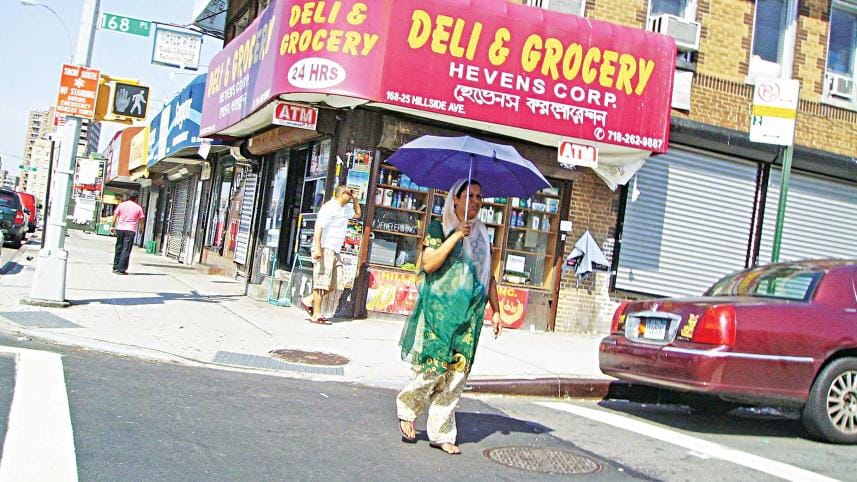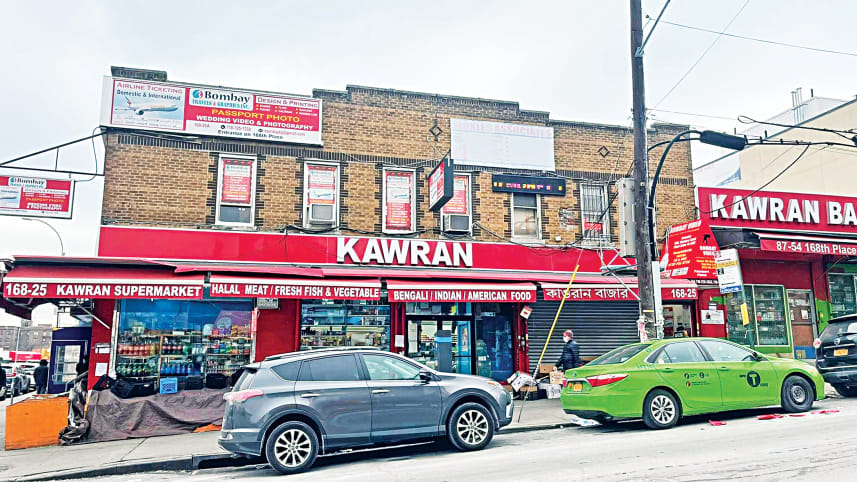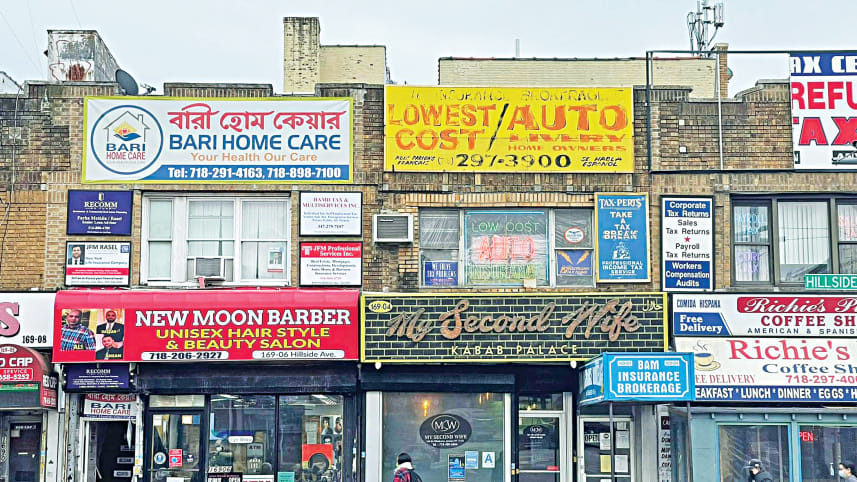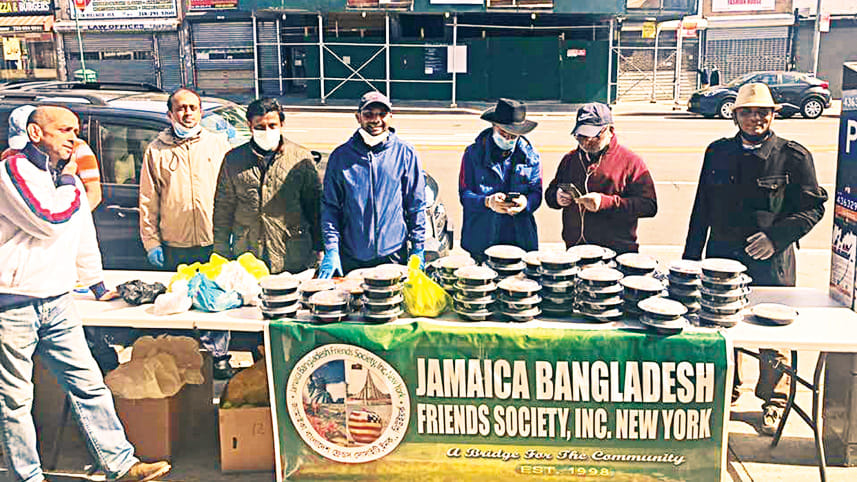Jamaica, NY: A slice of Bangladesh away from it

#Perspective
It was the summer of 2013, I was strolling along Jamaica's Hillside Avenue and turning my neck every time I was hearing someone utter something in Bangla. It was my first time in Jamaica, a neighbourhood in New York city's borough of Queens, which boasts a large population of Bangladeshi Americans and is considered one of the most ethnically diverse places on the planet.
Jamaica is a slice of Bangladesh away from it. With 'deshi' men and women speaking Bangla on the streets in traditional garbs like panjabi, pyjama and shalwar kameez, streets lined with Bangladeshi-owned restaurants and grocery stores selling your favourite 'deshi' vegetables, halal meats, and foods ranging from shingara-samosa, chotpoti-fuchka, naan-kabab, doi-mishti, and halua-paratha to kachchi biriyani, tehari, Haji-r biriyani and bhat-mach-bhorta, Jamaica is an instant reminder of the country you have left behind.

For a second, you might even forget that this place is very much a part of the continental US, and not somewhere in South Asia. Bangladeshis from all over America and even tourists visiting the US from Bangladesh, visit Jamaica for a taste of their homeland.
The cleanliness and customer service at Bangladeshi-owned stores and restaurants in Jamaica may not meet your expectations, especially if you are visiting from other parts of the US, but if your heart is craving 'deshi' food and 'deshi' vibes, this is the only place besides Jackson Heights that you would want to explore.
Jamaica is heavily populated by Bangladeshi Americans, many of whom or their immediate or extended family members arrived in New York after winning the Diversity Visa lottery in the 1990s and 2000s. The lottery winners brought with them their spouses and children under 21 years; the winners subsequently sponsored other immediate family members under family preference immigration categories, resulting in a large population of first-generation Bangladeshi immigrants calling Jamaica their home. Although Bangladesh is no more eligible to participate in the DV program, hundreds of people immigrate to the US from Bangladesh every year under family preference immigration categories.

Yasmin, 66, came to the US a decade ago after her brother sponsored her Green Card under a family preference immigration category. She currently resides in Jamaica. Asked what she feels about living in the neighbourhood, she said, "Everything is pretty much right outside your door, including the bank, post office, halal grocery stores, subway station, and bus stop.
"For someone like me who came to America in her 50s, this sort of convenience was necessary for survival," she added.
For Bangladeshi immigrants who come to the US in the later years of their lives, limited English proficiency is often the biggest hurdle to overcome. In a place like Jamaica, however, you do not need to worry about your English fluency.

"A large number of doctors of Bangladeshi origin practice in the area,
which means that even at a doctor's office, you can communicate in Bangla," she said.
There was a time when Bangladeshi Americans in New York City were known as a diaspora of taxi drivers and shopkeepers. Times have changed. Today, you will find thousands of accomplished engineers, physicians, entrepreneurs, and academics of Bangladeshi descent in the city. The children of fathers who once worked or still work as taxi drivers or shopkeepers excel in school and find a strong footing in mainstream America.
Mozammel Khan, who is an assistant manager at a 7-Eleven store in Manhattan, lived in multiple communities in and out of New York before settling in Jamaica. According to Khan, accessible public transportation, public schools and parks for children, banks, higher education institutions like St. John's University and York College, and last but not least, 'deshi' and Halal grocery stores and restaurants make Jamaica an enticing place to live.
"I have lived in Jamaica for most part of my life in America. For Bangladeshi Americans, there are countless perks of living here, including Bangladeshi restaurants like Sagar, Premium Sweets, Panshi, etc. Masjid Al-Mamoor, more commonly known as Jamaica Muslim Center, a mosque established by Bangladeshi Americans, is another added attraction of the place."

Khan, whose son recently entered Rochester Institute of Technology to study Computer Science, thinks that Jamaica is an affordable neighbourhood to live, much less crowded than the similar 'deshi' neighbourhood of Jackson Heights, and not a bad place to raise children.
"Jamaica is an affordable place to live for people with family. Living costs are much lower than most parts of New York City, which makes it an attractive neighbourhood for new immigrants," he said.
"I can't afford to live in Manhattan. However, the train system allows for easy transit to Manhattan as well as Long Island, making my daily commute to work hassle-free," he continued.
The residents of Jamaica complain of occasional street robbery, which is, however, not uncommon in big metropolises, and overall cleanliness of the neighbourhood being subpar. However, the joy, which comes from living around your 'own' folks, relishing 'deshi' cuisine whenever you want, and enjoying Eid, Ekushey February, Pahela Baishakh, and Bijoy Dibosh observations and celebrations, remains unmatched by typical American neighbourhoods.
Every day during the month of Ramadan, the Bangladeshi restaurants sell iftar fare. On Chand Raat, the Hillside Avenue buzzes with people. Bangladeshis come from other parts of New York and neighbouring states to partake in the Chand Raat merriment. Bangladeshis living out-of-state visit their friends and family in NYC during Eid times, because Eid genuinely feels like Eid in 'deshi' neighbourhoods like Jamaica and Jackson Heights.
On Chand Raat, Jamaica's Hillside Avenue comes alive with live music, young girls set up mehendi booths on the pavement, and men and women are spotted doing their last-minute Eid shopping.
All New York City public schools are closed on Eid-ul-Fitr and Eid-ul-Azha. It may be noted that the New York City public school system is the largest in the United States, with over 1.1 million students taught in more than 1,800 schools. The Bangladeshi-owned shops and restaurants are also closed on Eid days.

I have celebrated Eid-ul-Fitr with my extended family in Queens on a number of occasions; with schools and shops closed, Jamaica feels like an Eid day in Dhaka. On the streets, you see men, women, and children in traditional Bangladeshi outfits, chatting and laughing. They visit their friends, family and neighbours, prepare sumptuous meals at home, and exchange gifts and clothes, just like it is done in Bangladesh.
Ever wondered where America's largest Eid jamaat is held? The Jamaica Muslim Center organises the largest Eid congregational prayer in the US. Before the pandemic, as many as 15,000 men, women, and children congregated to offer their Eid prayers in the playground of Thomas A. Edison High School in Jamaica, Queens!
Nayla Aziz, an online business owner in her 30s, lives with her husband in Minnesota. Before moving to Minnesota, she used to reside in Jamaica with her parents and brother. Nayla says that she always misses the hustle of New York City, the resilience of New Yorkers, and the Bengali vibes and vibrancy that places like Jamaica offer.
"Because my parents still live in Jamaica, I visit them a few times a year. On my trips to Jamaica, I bring back kachchi biriyani, sweets, etc. from Bangladeshi restaurants for my family in Minnesota," she said. "We can find Indian and Pakistani-style biriyani here, but not Bangladeshi-style kachchi biriyani or beef tehari!"
"In addition to proximity to literally anything, from 'deshi' grocery stores to beauty parlours, Jamaica gives you a different kind of happiness," she continued. "The happiness comes from being around people who share your home country."
Bottom line
It is for places like Jamaica and Jackson Heights that the diaspora of Bangladeshi immigrants gets to immerse in the sights, sounds, and aroma of traditional cuisine of their birthplace. It is because we pride on our roots and rich cultural heritage that only a few of us, if any, would ever miss a chance to explore Jamaica and the like, when we visit the "Big Apple."
Photo: Litu Anam




 For all latest news, follow The Daily Star's Google News channel.
For all latest news, follow The Daily Star's Google News channel.
Comments